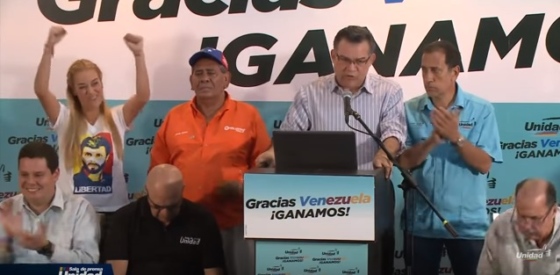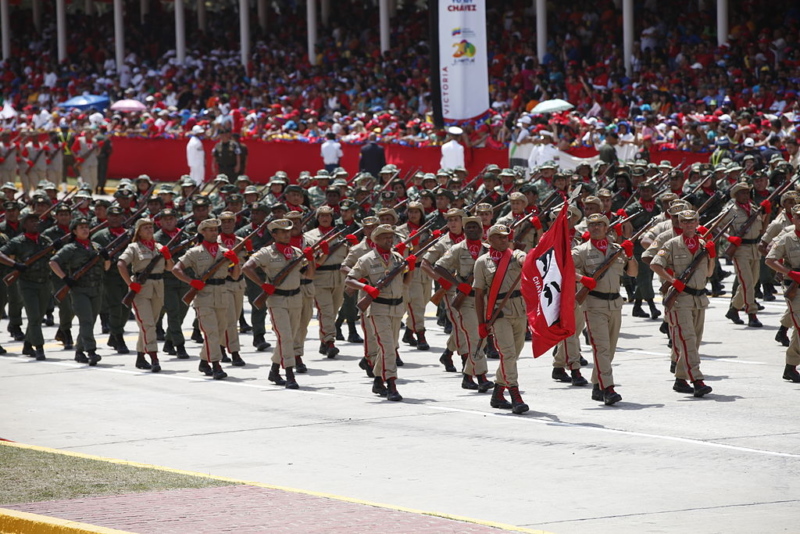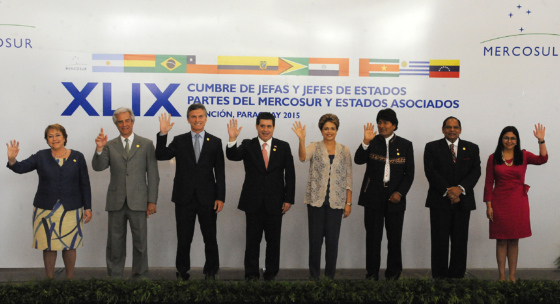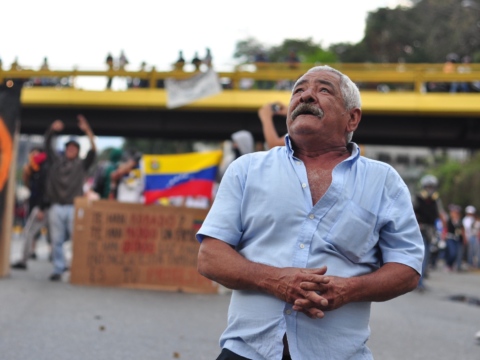
What Does the Future Hold for Venezuela?
What do the election results mean for President Nicolás Maduro and his grip on the presidency?
A Daily Publication of The Dialogue
Nearly a month after opposition leader Juan Guaidó assumed the role of interim president under Venezuela’s constitution, global powers are split over whether to recognize him or Nicolás Maduro, who remains in office after a flawed election last year thanks largely to the military’s support. Russia, China, Turkey and other nations continue to back Maduro, while most of Latin America, the United States, Canada and much of Europe are supporting Guaidó. Still others, such as Mexico, pledge to remain neutral. The European Union is establishing an “international contact group” to mediate the Venezuelan crisis. In what ways could mediation play out and bring a peaceful end to the standoff? How likely is wide-scale bloodshed, civil war or international military intervention to occur in the weeks ahead? What are the chances that China or Russia, each with billions of dollars invested in Venezuela, will shift allegiance and work with Guaidó? What developments could break the unity of Western nations on the matter?
Sergio Bitar, nonresident senior fellow at the Inter-American Dialogue and president of Consejo Chileno de Prospectiva y Estrategia: “For the first time, there is a solid convergence between Venezuelan opposition groups and parties and international democratic forces regarding the need for Maduro’s quick exit. The suffering to which he subjects his people, the erosion of democracy, the economic destruction and the humanitarian crisis are more than enough reasons for action. Guaidó’s open strategy of a peaceful exit, a short transitional government and the call for free elections also unites these democratic forces. Where danger lurks is in the way in which Maduro is deposed. All transitions show that the success of democratic recovery depends on how that change occurs. Violent action would not lead to a subsequent peaceful transition. Therein lies the danger of the threats of a Trump administration military intervention. No Latin American government will send their military to Venezuela. It would provoke the division of democratic forces that support change, may strengthen Maduro, and it would undermine a transitional government’s foundations and capacity to act. A democratic government born of external intervention would be doomed to fail. Internal and external convergence would be disrupted. And it would awaken nationalism, arouse unity in the armed forces, prevent the formation of a broad government, and even worse, it could trigger the transformation of ‘colectivos’ into armed opposition groups. Although Maduro may resist and delay his exit, the best way forward is the one defined by the National Assembly: active social mobilization, a call for all sectors—including dissidents of chavismo—to participate in a transitional government, a guarantee to the armed forces, and conviction that a better future will come soon. Impatience is a bad counselor.”
Abraham F. Lowenthal, professor emeritus at the University of Southern California and founding director of the Inter-American Dialogue and the Wilson Center’s Latin America Program: “Juan Guaidó has quickly generated impressive enthusiasm in Venezuela and garnered international recognition from the governments of the United States, Canada, most South American and many European countries. Thus far, however, he controls no territory, commands no military or security forces, and has no effective authority—and no clear prospect for gaining these. The Donald Trump administration seeks to resolve this dual ‘government’ impasse by managing international humanitarian assistance and targeted financial sanctions to split the armed forces and thus topple the authoritarian regime headed by Nicolás Maduro. But this bold intervention may fail, as Maduro and/or other officers mobilize popular sentiment and military attitudes to resist foreign imposition. Even if the Venezuelan armed forces divide, the polarization could spawn a bloody and prolonged conflict. The United States would own the unintended consequences of a U.S.-instigated coup. The time has come for the international community to encourage and facilitate quiet, serious, urgent and effective negotiations among Venezuelans, involving high representatives of the Maduro regime, the democratic political opposition, the private economic sector and civil society organizations. The terms of reference of these negotiations should be to establish an interim government acceptable to the negotiating parties in order to undertake needed political reforms and economic measures to set Venezuela on a promising course, and then to organize free, fair, credible and internationally monitored elections. Broad agreements, acceptable to all key participants, would have to be worked out regarding restoring authority to the National Assembly and impartial credibility to the judiciary; establishing processes of transitional justice that make mutual tolerance possible and avoid vengeance; outlining guarantees to respect the core institutional interests of the armed forces; freeing political prisoners; and providing supportive conditions for the economic reconstruction of a shattered country. This vision will be rejected as fantasy by some, but the history of transitions from authoritarian and exclusionary rule toward democracy in Chile, Brazil, Spain, Poland, South Africa and other countries is instructive. Successful transitions that seemed unimaginable were achieved when key elements on both sides come to accept that negotiations and mutual concessions were both necessary and possible—as they are today in Venezuela.”
Evan Ellis, Latin America research professor at the U.S. Army War College’s Strategic Studies Institute: “Mediation has been used repeatedly in recent years by the Maduro regime, when facing a serious challenge, to buy time, divide the opposition and disperse protesters. The constitutionally legitimate Guaidó government has shown it will not entertain such tactics this time. Europe’s posture, by giving hope to Maduro’s criminal accomplices, only delays their decision to abandon him, increasing the probability of chaos and bloodshed in that end. China has tepidly supported Maduro but is negotiating with both sides to protect its interests. It probably understands that Guaidó’s triumph would favor Chinese interests through competent professional management of PDVSA and the economy and an end to sanctions, but it may be too risk averse to abandon Maduro and seek those benefits until it is completely safe, and thus too late. Most members of the Venezuelan military want Maduro gone, yet are paralyzed by fear of their corrupted leadership and Cuban overseers. While their inaction is disappointing, President Guaidó has apparently delayed pursuing foreign military assistance (which is his sovereign right), due to the consequences in lives and perceptions. In waiting, while not understood by the press, time is on Guaidó’s side as the circle of international consensus closes, and Maduro’s criminal cabal is cut off from its money. Sadly, that delayed end will probably not be a story of Venezuelan military units recovering their honor and saving democracy, but a tragic free-for-all as a disintegrating military, ‘colectivos,’ Cubans and criminals such as the FARC and the ELN fight for the remains of the region’s once-wealthy petrostate.”
Bartłomiej Znojek, Latin America analyst at the Polish Institute of International Affairs (PISM): “Launched on Feb. 7 in Montevideo, the European Union’s international contact group (ICG) is meant to facilitate a condition-based, peaceful and inclusive democratic process to overcome the Venezuelan crisis. The goal is to avoid military escalation and to help pave the way to free and credible presidential election. The ICG members don’t want to call it a mediation effort to avoid comparisons with the hitherto failed dialogue attempts. They also have set a 90-day timeframe to assess the options and build confidence among key Venezuelan stakeholders, so that they opt for negotiations. A main challenge for ICG is a high level of mutual distrust between the government and opposition. It is still unknown what—if anything—could make Maduro accept an internationally verifiable democratic process. A tough stance led by the United States has been fueling his determination to cling to power, possibly because he is confident of having loyalty from the army and enough support from a few international allies—China and Russia in particular. The European Union opposes military escalation and maintains targeted sanctions. Still, ICG is limited to only several E.U. members, and there is no unity in the bloc on how to deal with the Venezuela crisis. Most of its largest members—France, Germany, Spain and the United Kingdom—recognize Guaidó. As does Poland, which is close to the situation as a non-permanent member of the U.N. Security Council. Italy was reportedly the main obstacle for a E.U. consensus on the matter, yet it does participate in the ICG.”
The Latin America Advisor features Q&A with leaders in politics, economics, and finance every business day. The publication is available to members of the Dialogue's Corporate Program and others by subscription.
What do the election results mean for President Nicolás Maduro and his grip on the presidency?
The intensity of the clash within Mercosur highlights how much has changed in South America since Venezuela joined the bloc four years ago.
On April 1st Michael Shifter was interviewed by Melissa Culross and Jon Bristow of KCBS News Radio based in San Francisco. The interview focused on a discussion of the events leading to the reversal of Venezuela’s Supreme Court decision to suspend the legislative powers of the General Assembly. Although many issues remain unsolved, the swift reversal of the decision served as a testament to the power of domestic and international pressures in influencing the government Michael said. Michael also discussed several other problems facing Venezuela such as crime, inadequate resources, and absent rule of law.
 Oscar CC BY-SA 4.0.
Oscar CC BY-SA 4.0.

